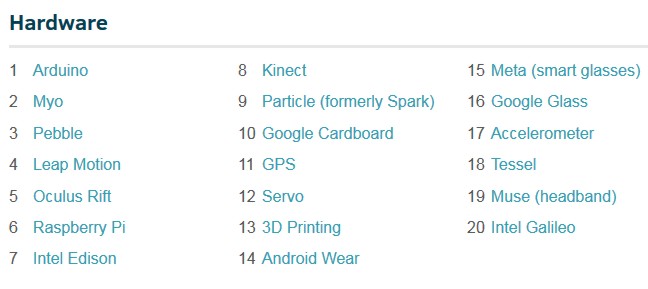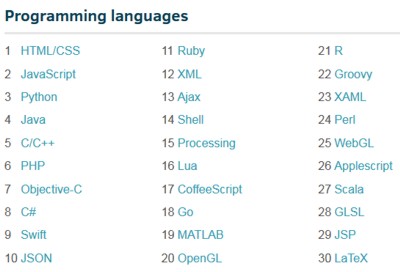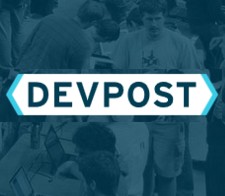| Devpost Reveals Student Hacker Preferences |
| Written by Janet Swift | |||
| Wednesday, 29 July 2015 | |||
|
Devpost is the new name of ChallengePost and has released its first Student Hacker Report which provides some interesting insights into the tools and technologies used in its hackathons. We've covered ChallengePost contests in the past, particularly the online ones for big name companies such as IBM, Samsung and Ford.
According to Brandon Kessler, Founder & CEO the change of name to Devpost which "more accurately describes who we are and what we do" came about when it noticed that its most successful and inspiring competitions were about software and tech, which also happened to be growing fast. It widened its scope to become a "home for hackers" and added a facility for developers to share software projects and build portfolios to showcase their apps. ChallengePost also made its tools free to anybody organizing an in-person hackathon and to date has powered over 700 such events and data from 160 student hackathons that used this digital infrastructure is the basis for the Devpost Student Hacker Report. As the report explains: During hackathons and within their portfolios, we encourage hackers to tag the platforms, technologies, languages, and APIs they use. This helps us capture a lot of data on the developer community. We looked at project tags from a sample of 13,281 student hackers who participated in 160 student hackathons and submitted 9,898 projects, either in hackathons or on their Devpost portfolios. The results in the report have raised some questions and even some eyebrows! Take a look at the list of preferred programming languages:
On Reddit one comment said: "I love that AJAX is in that list. That's not even remotely a language, let alone a programming language." The same could be said of HTML/CSS which tops the league, JSON, XML and XAML. But you have to remember that many of the contests were specifically for web development and required these skills. As the report explains: Most of the projects entered by our sample of student hackers include front-end web or mobile development and our language rankings reflect this. With only 24–48 hours at most hackathons, student lean toward API driven web & mobile projects. The emphasis on front end web development explains other findings. MongoDB comes top as choice of database, ahead of MySQL and SQLite and its companions in the MEAN stack are also well place - Express.js coming second to jQuery among Libraries and AngularJS and Node.js 3rd and 1st respectively in App Frameworks, with Flask, a Python framework appearing in the intervening slot. When it comes to IDEs Android Studio tops the list, followed by Xcode. This mirrors the finding that Android was nearly twice as popular as iOS. Commenting on this, the report states: It’s a little surprising to see Android place so solidly ahead of iOS, but the free-to-publish model gives it an edge with students working on weekend hacks.
Although Windows Phone was a poor third in the context of mobile, Visual Studio came in 4th place for IDE, behind Eclipse, and Azure topped the list of ten PaaS and IaaS providers. Given the way in which Microsoft promotes Visual Studio and Azure to students by making it free of charge and providing many contests and competitions of its own, it is hardly surprising to find it popular among this sample.
Devpost equates hacker with "experimenters" and "tinkerers" and hardware features in its report:
 The report comments:
Hardware was hugely popular in 2014–2015 among hackers and judges. 10% of prize winning projects were tagged “hardware,” 8.2% Arduino, 5.3% Pebble, 4.8% Leap Motion, 4.5% Myo, and 3.9% Oculus. Each of these hardware tags showed up in a higher percentage of winning hacks than non-winning hacks. During the spring semester, Pebble, Oculus, Leap Motion, Intel Edison, Raspberry Pi, Muse, and Meta grew in popularity, likely due to company sponsorship.
Sponsorship is of course important to DevPost and it also seems to work: The impact of hackathon sponsorship is clear: if you show up and participate, hackers will use your technology. We looked at the 20 companies that sponsored two or more student hackathons in 2014 and had 50 or more overall projects tagged with their technologies. The bottom line to would-be sponsors is: Sponsor hackathons, but don’t just write a check. It’s more effective to send developer evangelists who can work on-site with hackers. More InformationRelated Articles
To be informed about new articles on I Programmer, install the I Programmer Toolbar, subscribe to the RSS feed, follow us on, Twitter, Facebook, Google+ or Linkedin, or sign up for our weekly newsletter.
Comments
or email your comment to: comments@i-programmer.info |
|||
| Last Updated ( Friday, 31 July 2015 ) |




